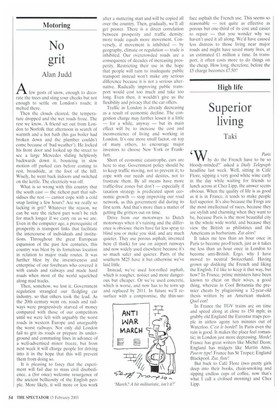No grit
Alan Judd
Afew gusts of snow, enough to decorate the trees and sting your cheeks but not enough to settle on London's roads; it melted there.
Then the clouds cleared, the temperature dropped and the wet roads froze. The rest we know. A friend set out from London to Norfolk that afternoon in search of warmth and a hot bath (his gas boiler had broken down and the plumber couldn't come because of 'bad weather'). He locked his front door and looked up the street to see a large Mercedes sliding helplessly backwards down it, bouncing in slow motion off parked cars before coming to rest, broadside, at the foot of the hill. Wisely, he went back indoors and switched on the kettle. The electricity was off.
What is so wrong with this country that the south east — the richest part that subsidises the rest — cannot cope with a cold snap lasting a few hours? Are we really so lacking in grit? Whatever the reason, we can be sure the richest part won't be rich for much longer if we carry on as we are. Even in the computer age, a prerequisite of prosperity is transport links that facilitate the intercourse of individuals and institutions. Throughout the great European expansion of the past few centuries, this country was blest by its fortuitous location in relation to major trade routes. It was further blest by the inventiveness and enterprise of our forebears who covered it with canals and railways and made hard roads when most of the world squelched along mud tracks.
Then, somehow, we lost it. Government regulation strangled our fledgling car industry, so that others took the lead. As the 20th century went on, roads and railways were progressively starved of money compared with those of our competitors until we were left with arguably the worst roads in western Europe and unarguably the worst railways. Not only did London fail to grit its roads or prepare its underground and commuting lines in advance of a well-advertised minor freeze, but from next week it will charge people for driving into it in the hope that this will prevent them from doing so.
It is pleasing to fancy that the experiment will fail due to mass civil disobedience, a (for once) welcome resurgence of the ancient bellicosity of the English people. More likely, it will more or less work after a stuttering start and will be copied all over the country. Then, gradually, we'll all get poorer. There is a direct correlation between prosperity and traffic density: more trade equals more movement. Conversely, if movement is inhibited — by geography, climate or regulation — trade is inhibited. Our overcrowded roads are a consequence of decades of increasing prosperity. Restricting their use in the hope that people will turn to inadequate public transport instead won't make any serious difference because it is not a serious alternative. Radically improving public transport would cost too much and take too long. Even then, it wouldn't give us the flexibility and privacy that the car offers.
Traffic in London is already decreasing as a result of economic decline, The congestion charge may further lessen it a little — for a while, anyway — but its main effect will be to increase the cost and inconvenience of living and working in London. It's one more small factor, on top of many others, to encourage major investors to choose New York or Frankfurt.
Short of economic catastrophe, cars arc here to stay. Government policy should be to keep traffic moving, not to prevent it; to cope with our needs and desires, not to frustrate them. By all means have more traffic-free zones but don't — especially if taxation strategy is predicated upon economic growth — stop improving our road network, as this government did during its first term. And that's more than a matter of getting the gritters out on time.
Drive from our motorways to Dutch motorways when it's raining and the difference is obvious: theirs have far less spray to blind you or make you skid, and are much quieter. They use porous asphalt, invented here (I think) for use on airport runways and now widely used elsewhere because it's so much safer and quieter. Parts of the southern M25 have it but otherwise we've laid little.
Instead, we've used hot-rolled asphalt, which is rougher, noisier and more dangerous but cheaper. Or we've used concrete, which is worse, and now has to be torn up and replaced by 2011. In future we'll resurface with a compromise, the thin-sur
face asphalt the French use. This seems so reasonable — not quite as effective as porous but one-third of its cost and easier to repair — that you wonder why we haven't used it all along. We'd have caused less distress to those living near major roads and might have saved many lives, at an estimated £1 million a time. In transport, it often costs more to do things on the cheap. How long, therefore, before the £5 charge becomes £7.50?


































































 Previous page
Previous page